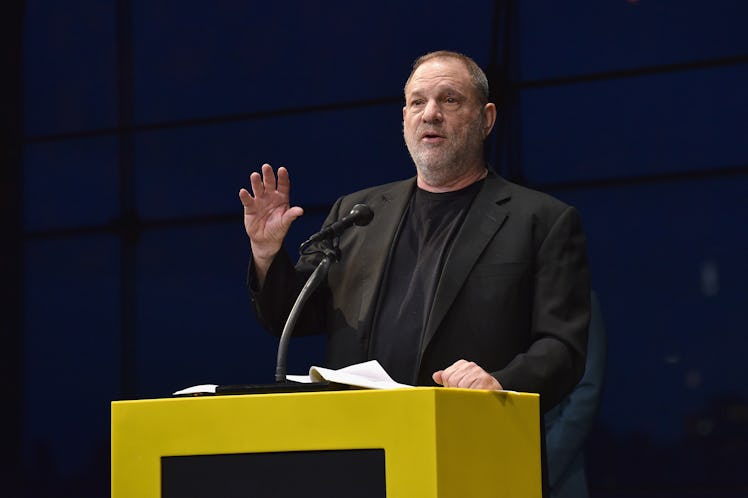
Sexual Harassment Isn't Just A Hollywood Problem & We Need To Talk About It
The film industry has been in turmoil since a report came out last week from The New York Times detailing decades of alleged sexual harassment by legendary producer Harvey Weinstein. In the week that followed, more reports and accusations came out, with upwards of 30 women coming forward with allegations against Weinstein. In response, Weinstein's spokeswoman said in a statement that "any allegations of non-consensual sex are unequivocally denied" and that "with respect to any women who have made allegations on the record, Mr. Weinstein believes that all of these relationships were consensual." The statement added that he is in counseling for his behavior. But the stories have prompted a necessary reckoning about sexism and power structures within the industry, and the truth is — and this is obvious to just about any woman you ask — that sexual harassment and other forms of misconduct aren't just a problem in Hollywood.
As more and more actresses came forward with their own stories of allegations against Weinstein, women in other industries began speaking up as well. Because ultimately — and, again, this is pretty obvious to every woman everywhere — sexual harassment is not committed by just one type or one generation of man. It's also not solely committed by men against women — women can be the offenders and men can be victimized, but statistically, women are more likely to be victims of sexual violence and men are more likely to commit it. Sexual harassment is non-partisan. It doesn't just happen in one industry.
The awful truth is that sexual harassment happens in all environments, any time, anywhere, and can pressure women across industries. Sexual harassment and assault at the hands of a coworker, a peer, or a colleague in a position of power, holds women back from having gender equality and keeps women held down, not just taking away the opportunities men are afforded, but often erasing them entirely.
Conversations about sexual harassment are emerging as non-film people reflect on their own experiences. As a woman involved in both the journalism and classical music industries, I've already seen more conversations about sexual harassment taking place, prompted by the Weinstein allegations. Just this week, after the allegations against Weinstein first emerged in a New York Times article published on Oct. 5, an anonymous document began circulating among female journalists detailing instances of gender-based misconduct — ranging from allegations of rape to general creepiness — allegedly committed by male members of the journalism community. Outside of the privately shared document (and other private discussions between female journalists) were the publicly shared tweets more generally calling out men in media.
Meanwhile, at least two first-person pieces have already been published by members of the classical music industry detailing multiple alleged instances of sexual harassment and assault — one from a gay man, Dan Kempson, and one from a woman, Susanne Mentzer. Both are singers.
"It’s time for the opera world to also look at its own epidemic of sexual harassment and assault," Kempson wrote.
Kempson is right, but it goes beyond that; it's time for every industry to examine itself and to get vocal about what lies beneath. It's not enough for women, who are statistically more likely to be victims of sexual violence, to whisper about instances of harassment or weirdness (and, yes, we are talking about it when it happens). We also need men to listen, take us seriously, pay attention, and speak up in response, because sexual harassment happens everywhere, but, as a country, we're still not in a place culturally where women can confidently report harassment without fear of retaliation.
As Mentzer summarized perfectly,
If I had stood up to these men by reporting them, I know my career would have been over long ago. It is not right but it is how it is.
We all need to work on creating a culture where sexual harassment is more controversial than just "calling out sexual harassment." That starts on an individual level. While it's helpful for women to do what we can to prevent sexual harassment, it's not just a woman's burden to bear — everyone needs to be involved.
More than anything, we need men to do work, because sexual violence largely comes from men. Actress Emma Thompson put it best in an interview with the BBC, saying,
This has been part of our world — women's world — since time immemorial. So what we need to start talking about is the crisis in masculinity, the crisis of extreme masculinity, which is this sort of behavior, and the fact that it is not only OK, but it also is represented by the most powerful man in the world at the moment.
Men can help nullify the cycle of harassment and assault by analyzing their own behaviors, both in and out of the workplace. Change of any kind begins on an individual level. So, to the men in the room and around the world, start by listening. If you feel comfortable, ask women you're close with if they'd be comfortable sharing their stories, because I can assure you, any woman you know has a story — if not more than one. Listen, trust, and try to understand how pervasive these stories are. And once you've done that, consider your own stake in it all. If you see or hear a fellow man you know saying or doing something that doesn't seem appropriate or respectful, we need you to call him out on it.
At the same time, we need you to also take a deep breath and examine your own behavior. Examine your words, actions, and impulses, and think about the women on the other side of them. We all need you to be better.